Hello lovelies!
Are you looking for a radiant and youthful skin? Then, you’re not alone!
Actually, achieving glowing skin is a common goal for many people. While you and I look for the perfect topical treatments and skincare routines, we must always remember that diet is equally important.
Indeed, the foods we consume can have a profound impact on our skin’s health. Thus, they have an impact on our appearance, and our ability to maintain a youthful glow.
In this article, we’ll explore how to achieve glowing skin through diet. We can all do that by focusing on key nutrients, beneficial foods, and practical dietary tips.
Disclaimer: This post contains affiliate links to help me support this blog. I may earn a commission whenever you click on the links and purchase the products, with no additional cost to you. Thanks in advance for your support!
Glowing Skin Through Diet: Beyond the Surface of Your Skin Health
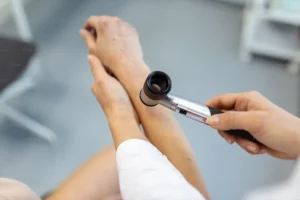
Our skin is the largest organ in the body. Therefore, like all organs, it requires specific nutrients to function optimally. Thus, a balanced diet providing essential vitamins, minerals, antioxidants, and healthy fats will improve your overall health. and this includes your skin texture and tone as well.
On the other hand, poor nutrition and nutritional deficiencies can lead to a variety of skin problems. They include dryness, acne, and premature aging.
For instance, a vitamin D deficiency will cause acne, rosacea, and skin irritation. Also, a lack of omega-3 fatty acids will cause early aging and dryness, while a deficiency in B vitamins will get you wrinkles.
Consequently, you must be very careful to get a balanced diet. Indeed, it reflects on your appearance, which is a major signal for your health. Never forget that!
Glowing Skin Through Diet: Nutrients Essential for Skin Glow
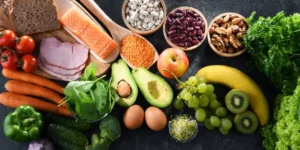
There are nutrients that are essential for anyone who craves skin glow. These are antioxidants, zinc, selenium, and omega-3 fatty acids. Also, hydration is extremely important if you want to get a lasting glow! All these nutrients work together to promote skin health and address common skin concerns.
Antioxidants (vitamins A/C/E)
Vitamin A
Vitamin A is essential for skin repair and regeneration. Also, it helps to maintain the integrity of skin cells and prevent dryness and flakiness.
Sources: sweet potatoes, carrots, spinach, kale, and apricots.
Vitamin C
Vitamin C is a powerful antioxidant that protects the skin from oxidative stress. Moreover, it supports collagen synthesis, which is vital for maintaining skin elasticity and firmness.
Sources: citrus fruits (oranges, lemons, grapefruits), strawberries, kiwi, bell peppers, and broccoli.
Vitamin E
Vitamin E works in conjunction with vitamin C to protect the skin from damage caused by free radicals. Also, it helps in maintaining skin moisture and preventing dryness.
Sources: Almonds, sunflower seeds, hazelnuts, avocados, and spinach.
Omega-3 Fatty Acids
Omega-3 fatty acids are anti-inflammatory. They help to keep the skin moisturized and supple. Moreover, they can reduce redness, acne, and other inflammatory skin conditions.
Sources: Fatty fish (salmon, mackerel, sardines), flaxseeds, chia seeds, and walnuts.
Zinc
Zinc is an important nutrient for skin healing. Indeed, it helps combat acne by regulating oil production and inflammation.
Sources: Pumpkin seeds, lentils, chickpeas, quinoa, and oysters.
Selenium
Selenium protects the skin from oxidative damage and maintains skin elasticity.
Sources: Brazil nuts, sunflower seeds, brown rice, and mushrooms.
Hydration: the foundation of glowing skin
Proper hydration is fundamental to maintaining healthy and glowing skin. Indeed, water helps to flush out toxins, maintain skin moisture, and support cellular function. Consequently, I recommend you aim to drink at least eight glasses of water a day.
Moreover, you should consider incorporating hydrating foods into your diet, such as:
- Watermelon: High in water content and vitamins A and C.
- Cucumber: Contains antioxidants and has a high water content.
- Celery: Packed with water, vitamins, and minerals.
I’ve written a previous article on foods to eat for a beautiful skin. This is another resource that might help you make the best dietary choices for your skin!
Glowing Skin Through Diet: Tailoring Your Diet for Optimal Skin Health
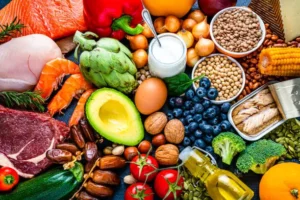
Eat a Balanced Diet
Ensure your diet includes a variety of fruits, vegetables, whole grains, lean proteins, and healthy fats. This diversity will help you obtain all the essential nutrients your skin needs.
Include Probiotics
A healthy gut microbiome is linked to improved skin health. Include probiotic-rich foods like yogurt, kefir, sauerkraut, and kimchi in your diet to support your gut and skin. However, if you’re not familiar with some of these foods, I recommend you take a probiotics supplement like the Puritans Pride Probiotic Acidophilus Tablets.
Don’t Skip Healthy Fats
Healthy fats are crucial for maintaining your skin hydration and elasticity. Therefore, include sources of omega-3 and omega-6 fatty acids. For instance, eat lots of fish, flaxseeds, chia seeds, and nuts.
Stay Hydrated
In addition to drinking plenty of water, include hydrating foods in your diet. Herbal teas and water-rich fruits and vegetables can help you stay hydrated and your support skin health.
Adjust Your Diet to your Taste and your Budget
I’ve always heard that eating well can be expensive. But you don’t have to spend money like a celebrity! Plan carefully your budget and buy foods that are within your reach.
Also, don’t feel forced to eat all the foods I mention in this article. Indeed, you may not like some of them. or worse, you can be allergic to them. If this is case, skip these foods that are problematic for you. And stick to what you like. Your life should be pleasant!
Glowing Skin Through Diet: Adapt Your Diet To Your Skin Type
Just like your skincare routine, you can adapt your diet to your skin type. For example, if you have dry skin, eating lots of omega-3 fatty acids will complement your skincare routine wonderfully. Think of what your skin needs and adapt your diet accordingly. Your skin will thank you!
Glowing Skin Through Diet: Cook with Skin-Friendly Ingredients
When preparing meals, use ingredients that benefit your skin. For example, cook with olive oil or coconut oil instead of butter. Season your dishes with herbs and spices which have anti-inflammatory properties like turmeric and ginger.
Glowing Skin Through Diet: Create a skin-friendly menu
Did you know that you could create a personalized skin-friendly menu to complement your skincare routine? For instance, here’s a sample meal plan to help you incorporate skin-friendly foods into your diet:
Breakfast
- Smoothie: Blend spinach, kale, a handful of berries, half an avocado, and a tablespoon of chia seeds with almond milk.
- Whole Grain Toast: Top with mashed avocado and a sprinkle of pumpkin seeds.
Mid-Morning Snack
- Greek Yogurt: Add a drizzle of honey and a handful of walnuts.
Lunch
- Salmon Salad: Grilled salmon on a bed of mixed greens with cherry tomatoes, cucumber, and bell peppers, dressed with olive oil and lemon juice.
- Quinoa: A side of quinoa mixed with chopped parsley and a squeeze of lemon.
Afternoon Snack
- Apple Slices: Serve with a handful of almonds.
Dinner
- Grilled Chicken: Seasoned with turmeric and served with a side of roasted sweet potatoes.
- Steamed Vegetables: Broccoli, carrots, and Brussels sprouts drizzled with olive oil.
Evening Snack
- Green Tea: A cup of antioxidant-rich green tea.
- Dark Chocolate: A small piece of dark chocolate (at least 70% cocoa).
Please keep in mind that this menu is only a sample. You can adapt it to your own eating habits.
Glowing Skin Through Diet: Foods to Favor for Luminous Skin
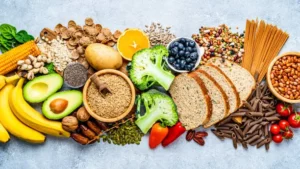
Certain foods are particularly beneficial for achieving glowing skin due to their high content of skin-friendly nutrients. Here are some top picks:
Berries
Blueberries, strawberries, and raspberries are rich in antioxidants. Therefore, they protect your skin from free radical damage. Thus, they are the best foods to promote a youthful appearance.
Avocados
Avocados are a great source of healthy fats, vitamin E, and biotin. Therefore, they help to maintain skin moisture and elasticity.
Nuts and Seeds
Almonds, walnuts, flaxseeds, and chia seeds provide essential fatty acids, vitamins, and minerals that support skin health.
Leafy Greens
Leafy greens such as spinach, kale, and Swiss chard are packed with vitamins A, C, and K. Also, they contain antioxidants that promote clear, glowing skin.
Fish
Fatty fish like salmon, mackerel, and sardines are excellent sources of omega-3 fatty acids. They help to reduce inflammation and keep your skin hydrated.
Sweet Potatoes
Sweet potatoes are rich in beta-carotene, which the body converts into vitamin A. It supports your skin cell production and repair.
Tomatoes
Tomatoes contain lycopene, an antioxidant that helps protect the skin from sun damage and improves your skin texture.
Green Tea
Green tea is high in antioxidants and has anti-inflammatory properties. Therefore, it can improve your skin health while reducing redness and irritation.
Glowing Skin Through Diet: Common Dietary Mistakes to Avoid for Better Skin

Limit Sugar and Refined Carbs
High sugar and refined carb intake can lead to spikes in blood sugar, which can trigger acne and other skin issues. Therefore, try to limit your consumption of sugary snacks, white bread, and pastries.
Avoid Trans Fats and Processed Foods
Trans fats and heavily processed foods can cause inflammation and negatively impact your skin. Instead, choose healthier fats like those found in avocados, nuts, and olive oil.
I’ve written a previous article about the type of foods that are terrible for your skin. Don’t hesitate to read it for more information about them.
Glowing Skin Through Diet: Creating Lasting Dietary Habits For Your Skin Health
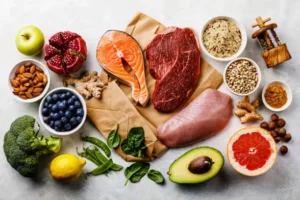
You must know that creating dietary habits that are beneficial for your skin is not immediate. Indeed, they must be included in a daily routine, and require a lot of self-discipline. Therefore, you must be systematic and deliberate in incorporating all these foods in your diet everyday.
Moreover, you mustn’t expect immediate results! Consequently, I advise to wait at least 3 months to witness the powerful effects of your newfound diet on your skin.
Also, for those who are inclined to mindfulness, I recommend you eat in silence. This is something I fail to do because I’m used to listening to a video or watching a TV show while I’m eating. And this is bad!
But if you can do it, I can assure you that your overall health will change for the better. And this includes your skin appearance!
Finally, don’t hesitate to combine your diet to a skincare routine adapted to your skin type. Thus, you’ll have the perfect combination to have the most perfect skin. And who knows? You will probably find the secret to eternal youth!
Conclusion: how to achieve glowing skin through diet?

You must include several nutrients in your diet to achieve glowing skin through diet. Indeed, you must eat a blend of antioxidants, fatty an acids, and other building blocks to achieve the perfect skin of your dreams.
Moreover, combining your diet with other lifestyle habits like skincare and mindfulness will help you achieve a glowing skin. So, how to achieve a glowing skin through diet? Just by implementing the right foods in your diet, eat them everyday, and wait for the results. It’s not that complicated, I promise!
Well, that’s all for today? What do you think on achieving glowing skin through diet? Do you already include these foods in your daily diet? Feel free to share in the comments below!
Take care, lovelies!
Want more content from me? Join my newsletter today and receive the latest updates of my website. Also, you’ll receive a wonderful gift in your email!


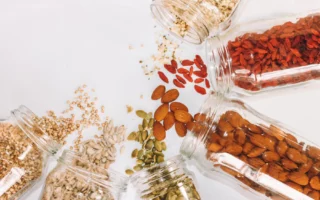


This article on achieving glowing skin through diet is incredibly insightful! I’ve always believed that what we put into our bodies reflects on our skin, and your breakdown of essential nutrients really highlights the importance of a balanced diet. The emphasis on hydration, omega-3 fatty acids, and antioxidants like vitamins A, C, and E resonates with me, especially since I’ve noticed a real difference in my skin’s texture and glow when I prioritize these nutrients.
I have a few questions, though, especially around personalizing this approach. For instance, how can someone with specific dietary restrictions (like a vegetarian or vegan diet) ensure they’re getting enough of these key nutrients? I know plant-based sources for omega-3s and zinc exist, but are they as effective as those from animal products?
Also, I’d love to hear your thoughts on the role of supplements. While I try to get most of my nutrients from food, I’ve considered adding a vitamin C supplement to boost my skin’s radiance. Do you think supplements can be as effective as food sources, or is it better to stick to whole foods whenever possible?
From my experience, consistency is key. I’ve been focusing on eating more leafy greens, nuts, and fatty fish for the past few months, and I’ve noticed a significant improvement in my skin’s overall health. However, I still struggle with the occasional breakout. Could this be related to diet as well, or are there other factors I should consider?
Finally, I appreciate the reminder about being patient and mindful. It’s easy to get discouraged when results aren’t immediate, but your advice to give it time and combine it with a good skincare routine is a great approach. I’ve also found that being mindful during meals—not rushing and really enjoying the food—has had a positive impact on my digestion and, by extension, my skin.
Thank you for such a comprehensive guide! I’m excited to implement more of your tips and see how they work for me. Would love to hear your thoughts on my questions!
Hello Lawrence, thanks for your comment! Concerning your first question, omega_3 from plant based sources are not as effective s animal-based omega_3 fatty acids. You may need supplement if you’re vegan or vegetarian; or eat enriched foods. For your 2nd question, you may add supplements to your diet. Unfortunately, our current diet is depleted from many nutrients because our soils are not so rich in minerals anymore. This is due to pollution and man-made mismanagement of nature, as well as intensive agriculture due to capitalistic gain. Hope that this helps, and don’t hesitate to revert back to me concerning your results!
What we eat is so important, not only to stay healthy, but also to have radiant skin. Drinking lots of water can noy only help you to stay hydrated, but can flush put toxins in the body and help to keep your skin looking plump.
Itis interesting to see that you have included probiotics as a means to get glowing skin. Although I eat yoghurt, I do not have it on a daily basis. So how much yoghurt should one have to get enough probiotics to get a glowing skin? Or is it better to take a supplement of probiotics? Thank you.
One yoghourt a day us not enougj. Supplement yourself!
I’ve always believed that what we eat is as crucial as the skincare products we use. Incorporating these nutrient-rich foods can really make a difference. Personally, I’ve noticed my skin looking more radiant since I started adding more berries and avocados to my diet. The tip about hydration is also key. Drinking plenty of water and including hydrating foods like cucumber has really helped me maintain a youthful glow. Thanks for the practical tips and the reminder to keep our diet balanced and skin-friendly. Can’t wait to try out the sample menu you provided!
Thanks for your comment!
I always thought hydration and a few other basics were the main factors for healthy skin, but it’s fascinating to learn how much more there is to consider. It turns out that antioxidants, healthy fats, and specific vitamins all play significant roles in achieving glowing skin. This deeper understanding really shows how interconnected our diet and skin health are, emphasizing that a well-rounded approach to nutrition can make a big difference in our overall skin appearance.
Yes indeed!
Yeah! It is true that what you eat affects your skin health.
And yes it is good to eat healthy not just for glowing skin, but for one’s overall health.
In current day, we eat a lot of ultra-processed food which is totally not good for our health along with a lot sugar, like you wrote.
We should really watch how we eat to be able to maximise life’s benefits!
Thanks for the article!
You’re Welcome !
I like how your article highlights the importance of including essential nutrients and foods that promote glowing skin. I appreciate the emphasis on both the benefits of specific vitamins and minerals, like vitamins A, C, and E, omega-3 fatty acids, zinc, and selenium, and practical advice on maintaining hydration for optimal skin health.
What are your thoughts on the dietary recommendations mentioned here? Do you find any particular strategy especially effective or have you encountered challenges in adopting these habits?
Hello Rach! Thanks for your comment! Yes, I enjoy the dietary recommendations. But the main challenge for me has been to remain disciplined and be healthy all the time! Especially when you’re born with a sweet tooth like me. However, nothing is impossible so…
This article on achieving glowing skin through diet is both eye-opening and practical! It’s so refreshing to see the emphasis on how our food choices directly impact our skin’s health and appearance. I’ve personally found that when I focus on incorporating more nutrient-rich foods into my diet, my skin definitely feels more vibrant and hydrated.
For example, after adding more omega-3-rich foods and antioxidants like berries and avocados into my meals, I noticed a real difference in my skin’s texture and glow. It’s a great reminder that while skincare products are important, what we eat plays a huge role too.
Have you ever tried adjusting your diet for better skin results? What changes did you notice?
I’ve tried what I preach and I noticed a new glow!
Quite an interesting article. It seems reducing cognitive decline is a pursuit many of us have. We turn to supplements, because that is the easy way, compared to the cognitive and mental exercises that could potentially help.
Of the criteria to determine if the supplement is a quality product, you stated the money back guarantee. Please explain how this is a determinant of quality. I am not seeing how this is evidence of quality. Please help me understand.
Have you thought of doing an effectiveness comparison of the supplements versus cognitive exercises that some say improve cognition? I think this would be an interesting study.
I found the information intriguing and would like to see more detailed information as to the results of specific studies showing cognitive maintenance. Can you point me to such studies?
I’m confused what are u talking about????
You’ve laid out everything so clearly, and I love how you emphasized the role of hydration and incorporating healthy fats like avocados into your meals. It’s refreshing to see a focus on beauty from the inside out. I’m curious, do you have any favorite go-to recipes that combine these skin-boosting ingredients? Also, you mentioned the importance of cutting back on sugar—do you have any tips for managing those sweet cravings without sacrificing skin health? Thanks for putting together such a helpful guide; I’m definitely going to be more mindful of what I eat now!
Thanks for your comment !